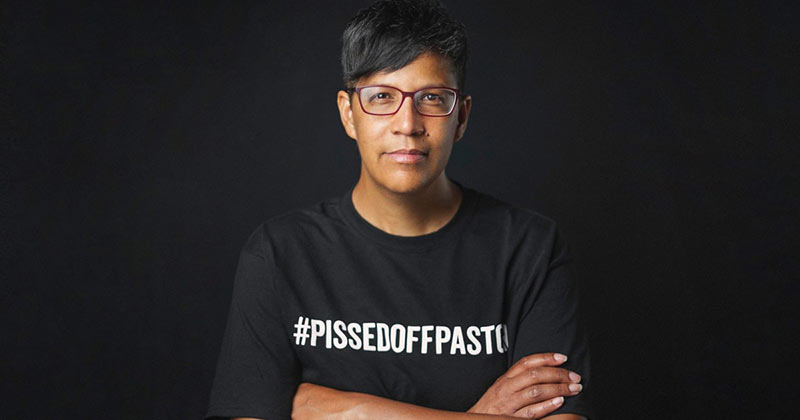Kara Baylor: channeling her anger for change

Kara Baylor is finding her voice, and she has a t-shirt to prove it. This summer she started a blog called #pissedoffpastor, and a line of t-shirts.
Baylor was asked to speak at a rally in Kenosha, Wis., shortly after George Floyd died at the hands of Minneapolis police. She hadn’t done anything like this before, but quickly discovered she had a few things to say.
In an earlier story about Baylor done by LSTC, she credited the seminary for shaping her for ministry. Now she says recent events in society, and even her position as a campus pastor at Carthage College (Kenosha), are shaping her future.
She is finding her voice and paying attention to her anger.
“I’m so angry. And some might say ‘It’s about time Kara.’ As a person adopted by white people, I have been protected by white people and have lived in the world of white people my whole life. I use Skatrud (her name is Kara Skatrud Baylor) when I want to, and I recognize my own privilege in that.”
After the Floyd murder, she wrote a Facebook post in which she signed off #pissedoffpastor. “Obviously, I was mad.” When she was asked to speak at the “Justice for George” rally, she asked on Facebook for fast connections for a #pissedoffpastor t-shirt. A friend knew a friend… and when her photo wearing the t-shirt behind the microphone appeared in the Kenosha news and on social media, it drew attention. People started asking for one, so she put in her own order for 150 and established a website (pissedoffpastor.org).
“I said yes right away,” she recalled about being asked to speak. “I’m a gut person and I know that I’m going do it. I knew I had to do it. I contacted Steve Jerbe [LSTC grad, pastor and activist], who gave me encouragement and helped me think through what I wanted to say. It was about me finding my voice. I have always thought that because of my social location as a black person raised by white people, married to a black man and as a mother of black kids, this moment to use my voice would come, and it felt that this was the moment. No more cool and calm and collected to make everyone comfortable. I knew it was time.”
“I’m not the first to have this hashtag, but I might be the first to sell t-shirts. In this day and age, people of faith should be angry; righteous anger,” she said, adding that anger is a great motivator and that the church has often been part of the problem. “We should be angry about racism, LGBTQ issues, sexual identity… I love what I’ve learned through faith, but I don’t love the things that have been so damaging. How do we face those things?”
She took the same advice she’s given high school students—to push some limits as you find your own voice. Still, at the rally she was nervous and had notes. She said it felt like coming out during Pride month: “It was the right time to say something about the issues of this time.”
In this time, she is also examining what it means to “live and work in Kara space.” For instance, she wonders if her cousins know that when she drives away from family reunions at Luther College (her alma mater) in Decorah, Iowa, that although it’s a “safe and lovely place to be,” she still has to worry about what could happen if she as a black woman gets pulled over?
Perhaps Baylor’s first blog entry on her website explains it best (edited for space):
“It wasn’t until seminary, in my late 20s, that I started to claim my Blackness. I went to LSTC… because I knew it would be the place that would challenge me to think about what it meant to be a Black leader in the ELCA. The best part of seminary for me was the dialogue group between Black and White women. I wasn’t really interested in the white women at all. I was there to learn and hear from the Black women… They helped me to know that I was just fine the way I was. They helped me understand that black is beautiful, black is full of uniqueness, and that I didn’t have to change to meet someone else’s expectation of Blackness. These are still lessons that I need to draw upon and remember when I wonder if I’m going to fit in. I am who I am.
“So, what do I mean when I talk about, ‘Claiming My Blackness?’ I mean, my story is my story. It is unique in that I surprised many doctors and other professionals when they met Kara Skatrud with brown skin. Yet my story is the same as so many other Black women. Sadly, most of us have a stories about inappropriate things that white men have said to us. Claiming My Blackness means claiming my voice to share my story and to push for change for a better world for future generations. It also means not looking to white people for validation that it is okay to speak. Claiming My Blackness means claiming my space in the world and in the church without having to make white people feel comfortable with my presence. The journey to Claiming My Blackness is a lifelong adventure. Sharing my story is part of that journey… Hopefully, sharing my journey, my story, will truly be helpful to others. There is strength in our stories.”